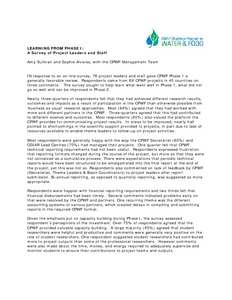Resource information
IN response to an on-line survey, 76 project leaders and staff gave CPWF Phase 1 a
generally favorable review. Respondents came from 68 CPWF projects in 45 countries on
three continents. The survey sought to help learn what went well in Phase 1, what did not
go so well and can be improved in Phase 2.
Nearly three-quarters of respondents felt that they had achieved different research results,
outcomes and impacts as a result of participation in the CPWF than otherwise possible from
‘business as usual’ research approaches. Most (84%) agreed that they had worked with
more and different partners in the CPWF. Three-quarters agreed that this had contributed
to different science and outcomes. Most respondents (80%) also valued the platform the
CPWF provides for communicating project results. In areas to be improved, nearly half
pointed to shortcomings in the scientific support provided to projects, in part due to lack of
resources available to enable theme leaders to follow-up on project activities.
Most respondents were generally happy with the way the CPWF Secretariat (60%) and
CGIAR Lead Centres (70%) had managed their projects. One quarter felt that CPWF
technical reporting requirements had not been useful. Respondents expressed frustration
that reporting formats changed during the course of the project, but more so that they were
not conceived as a cumulative process. There were expectations that periodic technical
reports would have been structured to be amalgamated into the final report at the end of
the project, yet this was not so. Respondents also commented on lack of feedback by CPWF
(Secretariat, Theme Leaders & Basin Coordinators) to project leaders after report
submission. Bi-annual reporting, as opposed to quarterly reporting, was suggested as more
appropriate.
Respondents were happier with financial reporting requirements and two thirds felt that
financial disbursements had been timely. Several comments indicated problems early on
that were resolved by the CPWF and partners. One recurring theme was the different
accounting systems of various partners, which created delays in compiling and submitting
reports in the required CPWF format.
Given the emphasis put on capacity building during Phase I, the survey assessed
respondent’s perceptions of the investment. Over 75% of respondents agreed that the
CPWF provided valuable capacity building. A large majority (85%) agreed that student
researchers were helpful and productive and comments were generally very positive on the
role of student researchers. One respondent suggested student researchers had contributed
more to project outputs than some of the professional researchers. However comments
were also made about the time, money, and energy required to adequately supervise and
monitor students to ensure their contributions to project teams and outputs.


